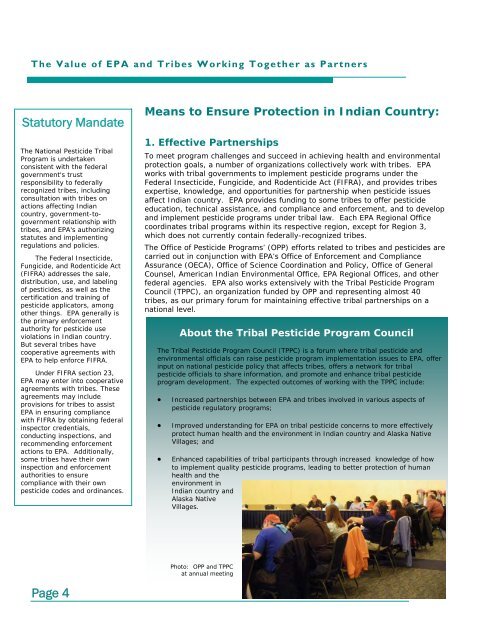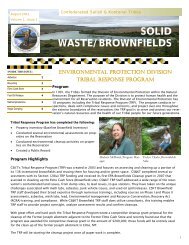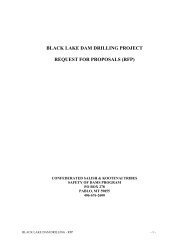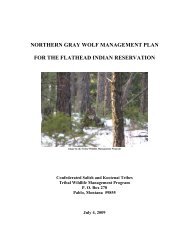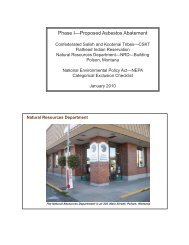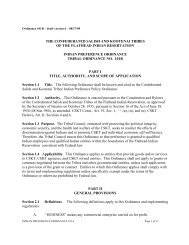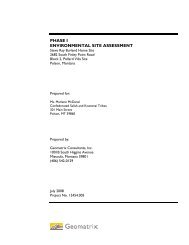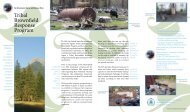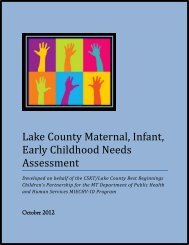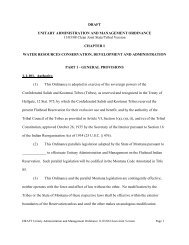US EPA - The National Pesticide Tribal Program - US Environmental ...
US EPA - The National Pesticide Tribal Program - US Environmental ...
US EPA - The National Pesticide Tribal Program - US Environmental ...
Create successful ePaper yourself
Turn your PDF publications into a flip-book with our unique Google optimized e-Paper software.
<strong>The</strong> Value of <strong>EPA</strong> and Tribes Working Together as Partners<br />
Statutory Mandate<br />
<strong>The</strong> <strong>National</strong> <strong>Pesticide</strong> <strong>Tribal</strong><br />
<strong>Program</strong> is undertaken<br />
consistent with the federal<br />
government's trust<br />
responsibility to federally<br />
recognized tribes, including<br />
consultation with tribes on<br />
actions affecting Indian<br />
country, government-togovernment<br />
relationship with<br />
tribes, and <strong>EPA</strong>'s authorizing<br />
statutes and implementing<br />
regulations and policies.<br />
<strong>The</strong> Federal Insecticide,<br />
Fungicide, and Rodenticide Act<br />
(FIFRA) addresses the sale,<br />
distribution, use, and labeling<br />
of pesticides, as well as the<br />
certification and training of<br />
pesticide applicators, among<br />
other things. <strong>EPA</strong> generally is<br />
the primary enforcement<br />
authority for pesticide use<br />
violations in Indian country.<br />
But several tribes have<br />
cooperative agreements with<br />
<strong>EPA</strong> to help enforce FIFRA.<br />
Under FIFRA section 23,<br />
<strong>EPA</strong> may enter into cooperative<br />
agreements with tribes. <strong>The</strong>se<br />
agreements may include<br />
provisions for tribes to assist<br />
<strong>EPA</strong> in ensuring compliance<br />
with FIFRA by obtaining federal<br />
inspector credentials,<br />
conducting inspections, and<br />
recommending enforcement<br />
actions to <strong>EPA</strong>. Additionally,<br />
some tribes have their own<br />
inspection and enforcement<br />
authorities to ensure<br />
compliance with their own<br />
pesticide codes and ordinances.<br />
Means to Ensure Protection in Indian Country:<br />
1. Effective Partnerships<br />
To meet program challenges and succeed in achieving health and environmental<br />
protection goals, a number of organizations collectively work with tribes. <strong>EPA</strong><br />
works with tribal governments to implement pesticide programs under the<br />
Federal Insecticide, Fungicide, and Rodenticide Act (FIFRA), and provides tribes<br />
expertise, knowledge, and opportunities for partnership when pesticide issues<br />
affect Indian country. <strong>EPA</strong> provides funding to some tribes to offer pesticide<br />
education, technical assistance, and compliance and enforcement, and to develop<br />
and implement pesticide programs under tribal law. Each <strong>EPA</strong> Regional Office<br />
coordinates tribal programs within its respective region, except for Region 3,<br />
which does not currently contain federally-recognized tribes.<br />
<strong>The</strong> Office of <strong>Pesticide</strong> <strong>Program</strong>s’ (OPP) efforts related to tribes and pesticides are<br />
carried out in conjunction with <strong>EPA</strong>’s Office of Enforcement and Compliance<br />
Assurance (OECA), Office of Science Coordination and Policy, Office of General<br />
Counsel, American Indian <strong>Environmental</strong> Office, <strong>EPA</strong> Regional Offices, and other<br />
federal agencies. <strong>EPA</strong> also works extensively with the <strong>Tribal</strong> <strong>Pesticide</strong> <strong>Program</strong><br />
Council (TPPC), an organization funded by OPP and representing almost 40<br />
tribes, as our primary forum for maintaining effective tribal partnerships on a<br />
national level.<br />
About the <strong>Tribal</strong> <strong>Pesticide</strong> <strong>Program</strong> Council<br />
<strong>The</strong> <strong>Tribal</strong> <strong>Pesticide</strong> <strong>Program</strong> Council (TPPC) is a forum where tribal pesticide and<br />
environmental officials can raise pesticide program implementation issues to <strong>EPA</strong>, offer<br />
input on national pesticide policy that affects tribes, offers a network for tribal<br />
pesticide officials to share information, and promote and enhance tribal pesticide<br />
program development. <strong>The</strong> expected outcomes of working with the TPPC include:<br />
• Increased partnerships between <strong>EPA</strong> and tribes involved in various aspects of<br />
pesticide regulatory programs;<br />
• Improved understanding for <strong>EPA</strong> on tribal pesticide concerns to more effectively<br />
protect human health and the environment in Indian country and Alaska Native<br />
Villages; and<br />
• Enhanced capabilities of tribal participants through increased knowledge of how<br />
to implement quality pesticide programs, leading to better protection of human<br />
health and the<br />
environment in<br />
Indian country and<br />
Alaska Native<br />
Villages.<br />
Photo: OPP and TPPC <br />
at annual meeting <br />
Page 4


